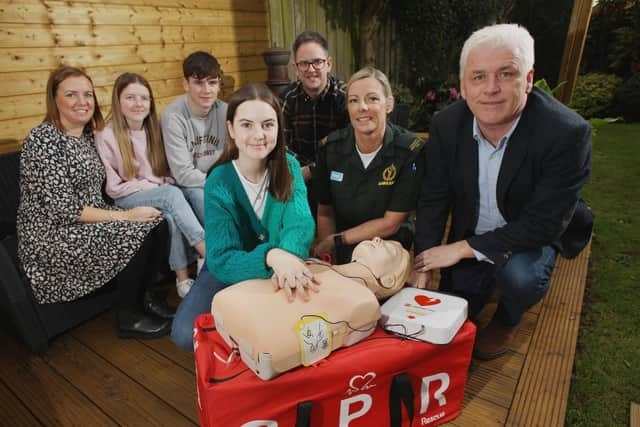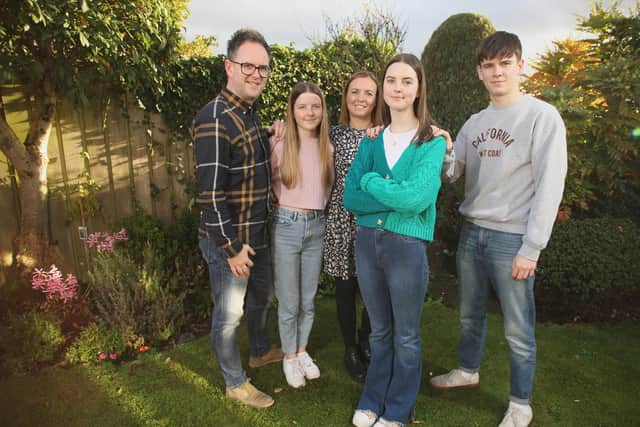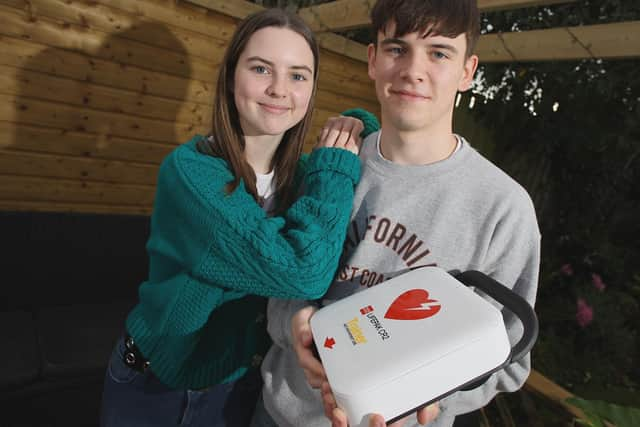Coleraine family says: “Help save lives like our Lucy’s”
and live on Freeview channel 276
Lucy King suffered a cardiac arrest in February last year and it was thanks to the quick actions of her family who quickly began CPR and ran to find the nearest defibrillator that she survived.
The Limavady High pupil’s family are urging defibrillator owners to register them with The Circuit – The National Defibrillator Network - a database which connects defibrillators to NHS ambulance services across the UK, so that in those crucial moments when someone is having a cardiac arrest they can be accessed quickly to help more people survive.
Advertisement
Advertisement
Since The Circuit first went live with the Northern Ireland Ambulance Service (NIAS) in February 2020 it has directed 999 emergency callers at the scene of a cardiac arrest to the nearest defibrillator in their community 582 times.


However, leading heart charity British Heart Foundation Northern Ireland (BHF NI), NIAS and other leading health organisations are urging more people to make sure their defibrillator is registered on the Circuit to save lives.
Lucy King’s mum Nicola, a former ICU nurse, recalled the terrifying moment the family realised their daughter had suffered a cardiac arrest.
Lucy had been asleep at home with Nicola, her dad Richard and siblings Thomas and Olivia when the incident happened.
Advertisement
Advertisement
“It was just a normal day last year for us. Lucy had been to Girls Brigade the evening before and then we all went to bed as normal,” said Nicola.


“At about 6am she made the loudest noise in her sleep, and we thought it was just a bad dream. We rushed into her room, and she was sitting upright static in the bed, but not really there, she then suddenly collapsed back into the bed. As a nurse myself I just went into autopilot and knew I had to start CPR. We phoned for an ambulance and my son Thomas who was 15 at the time ran in his pyjamas to get the nearest defibrillator from the local Spar in Limavady where we were living at the time.
“As he got back home with the defibrillator the ambulance crew arrived at the same time and they were able to shock Lucy twice at home before rushing her to hospital.”
Lucy was transferred to the Royal Hospital in Belfast where she remained in ICU for three days and in hospital for three weeks where she had a CRT-D fitted (cardiac resynchronisation therapy - defibrillator - a combined device that can pace and shock). Arriving home just as Northern Ireland went into the first lockdown, the champion Irish dancer was wheelchair bound and had to learn to walk and talk again. Lucy had also lost her short-term memory due to the cardiac arrest, thankfully this has and is still improving today. Lucy is back dancing and has a classroom assistant Stacey to help her at school.
Advertisement
Advertisement
Lucy’s parents later learned she had a genetic heart condition called left ventricular non-compaction cardiomyopathy. Nicola said Lucy’s incredible story of survival is proof of the importance of knowing CPR and performing quick defibrillation.


“The Circuit is such an important tool to help save more lives. Please if you are a guardian of a publicly accessible defibrillator, register it with The Circuit. Knowing where the nearest defibrillator is, really could make all the difference to someone’s life. Our family know that only too well.
“It has been a hard 18 months for us all and especially for Lucy, adjusting and coming to terms with what has happened. We always used to say your health is your wealth. We were a very healthy and sporty family, and Lucy’s cardiac arrest came out of nowhere. Lucy is continuing to improve every day, but we are so grateful to have her here with us and we want to make sure every family has that chance.”
Fearghal McKinney, Head of BHF NI said: “Every second counts when someone has a cardiac arrest and, alongside CPR, prompt use of a defibrillator is critical in giving them the best chance of survival. To put it simply, knowing where the nearest defibrillator is could be the difference between life and death.
Advertisement
Advertisement
“The Circuit is pioneering technology which will help emergency services direct bystanders more quickly to a defibrillator when someone collapses with a cardiac arrest. But for The Circuit to save lives, it is vital that unregistered defibrillators are put on the system. If you, or somebody you know is a defibrillator guardian, then we urge you to register your device on The Circuit. You could help save a life.”
Stephanie Leckey, Community Resuscitation Lead with NIAS said: “When someone calls 999 to report a cardiac arrest, the Emergency Medical Dispatchers in our control room can provide CPR instructions as well as the location of the nearest registered defibrillator, which greatly increases chances of survival.
“Once CPR is being administered, the next step in the Chain of Survival is defibrillation. The Circuit enables a bystander to retrieve the closest registered, emergency ready defibrillator and is a vital tool in helping increase bystander action to help someone in cardiac arrest.
“There are already over 2200 defibrillators registered on The Circuit in Northern Ireland, however we know there are more out there and I am urging members of the public who are guardians of a permanently fixed defibrillator to register it as soon as possible.”
Advertisement
Advertisement
Dr James Cant, Chief Executive Officer at Resuscitation Council UK, said: “A cardiac arrest can happen to anyone, anywhere, at any time. Not only is defibrillator use a crucial step in the Chain of Survival, the presence of defibrillators in public places can help raise awareness and stimulate people to think about what they would do in an emergency.
“Survival depends on all links in the Chain of Survival being carried out quickly. This means early recognition and calling for help, early CPR, early defibrillation and post resuscitation care – and The Circuit plays a vital role in giving people their best chance of surviving a sudden cardiac arrest.”
It’s free to register a defibrillator onto The Circuit, and it only has to be done once. It is also possible to register multiple defibrillators if you are the guardian to more than one. Visit TheCircuit.UK for more information or to register a defibrillator.